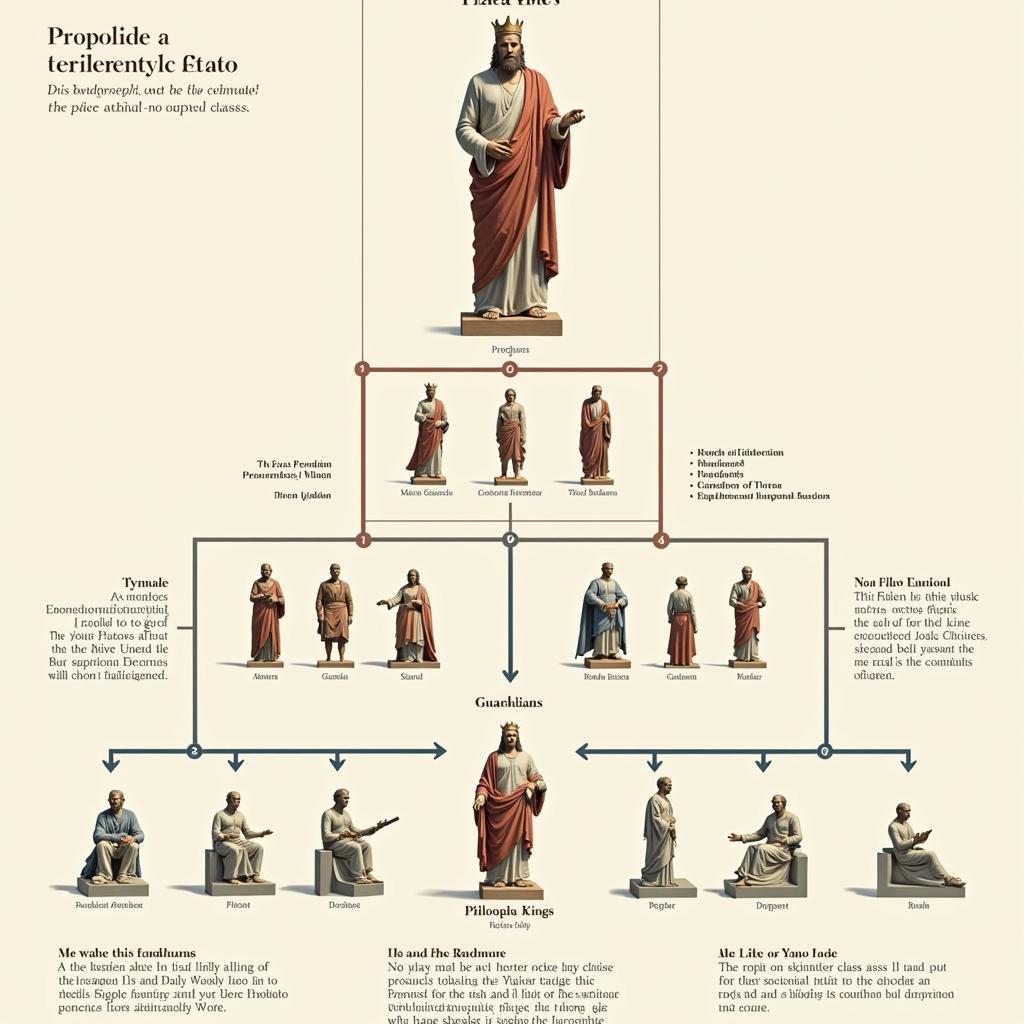Plato believed that society should be governed by people selected and educated for their wisdom and virtue, not by birthright or wealth. This core tenet of Plato’s philosophy, articulated in his seminal work The Republic, offers a compelling vision of an ideal state ruled by philosopher-kings. His ideas, though formulated centuries ago, continue to spark debate and inspire reflection on the nature of governance, justice, and the ideal society.
Who Should Govern Society? Plato’s Answer
Plato’s assertion that society should be governed by people specifically trained for leadership challenges the traditional power structures of his time and even resonates today. He argued that just as a skilled physician is best suited to heal the body, a skilled ruler, a “philosopher-king,” is best suited to heal the ills of society. These individuals would possess not only a deep understanding of justice and virtue but also the practical wisdom to apply these principles to the complex challenges of governance. This contrasts sharply with systems based on hereditary rule or the accumulation of wealth, which Plato viewed as inherently flawed. He believed that those who inherit power are not necessarily equipped to wield it responsibly, and those motivated by wealth are likely to prioritize personal gain over the common good.
This ideal ruler, according to Plato, emerges from a rigorous education system designed to cultivate wisdom and virtue. This education wouldn’t focus on practical skills or vocational training, but rather on the development of intellectual and moral character. Through the study of philosophy, mathematics, and other disciplines, future rulers would develop the capacity for abstract thought, logical reasoning, and ethical decision-making, essential qualities for effective and just leadership.
The Concept of the Philosopher-King
Plato’s concept of the philosopher-king is central to his political philosophy. He envisioned a society stratified into three classes: the producers (farmers, craftsmen, merchants), the guardians (soldiers, police), and the rulers (philosopher-kings). Each class would perform its designated function, contributing to the overall harmony and stability of the state. The philosopher-kings, at the apex of this hierarchy, would possess a deep understanding of the Forms, the eternal and unchanging truths that underpin reality. This understanding would enable them to make wise and just decisions, guided by reason and virtue, rather than by personal desires or political expediency.
This concept, however radical for its time, highlights Plato’s belief in the power of knowledge and reason to shape a just and prosperous society. He believed that true leadership stems not from force or manipulation but from a genuine understanding of the principles that govern human flourishing.
 Plato's Ideal Society and Governance Structure
Plato's Ideal Society and Governance Structure
Why Did Plato Believe This? Exploring the Flaws of Existing Systems
Plato’s advocacy for rule by philosopher-kings arose from his deep dissatisfaction with existing forms of government. He witnessed firsthand the corruption and instability that plagued Athenian democracy, and he believed that these problems stemmed from the flaws inherent in systems that placed power in the hands of the uneducated and the easily swayed. He argued that democracy, in its pure form, could easily devolve into mob rule, driven by emotion and self-interest rather than reason and wisdom.
Similarly, he criticized oligarchies, where power is concentrated in the hands of a few wealthy individuals, arguing that such systems inevitably lead to oppression and inequality. He saw these systems as inherently unstable, prone to internal conflicts and external threats.
Conclusion: Plato’s Enduring Legacy on Governance
Plato believed that society should be governed by people chosen for their wisdom and virtue. His concept of the philosopher-king, though idealized and perhaps impractical in its pure form, continues to provoke thought and discussion about the nature of leadership and the ideal society. While the perfect philosopher-king might remain elusive, Plato’s emphasis on wisdom, virtue, and reason as essential qualities for governance remains a powerful and enduring legacy. His work compels us to question existing power structures and to strive for a more just and equitable world.
FAQ:
- Who were the philosopher-kings according to Plato? Philosopher-kings were individuals trained in philosophy and reason, destined to rule with wisdom and justice.
- Why did Plato reject democracy? Plato believed pure democracy could devolve into mob rule driven by emotion, not reason.
- What were the three classes in Plato’s ideal society? Producers, guardians, and philosopher-kings.
- What is The Republic by Plato about? It explores the concept of justice and outlines Plato’s vision of the ideal state.
- What are the Forms in Plato’s philosophy? The Forms are eternal and unchanging truths that underpin reality.
- How did Plato’s experiences influence his views on governance? Witnessing the instability of Athenian democracy shaped his belief in the need for wise rulers.
- Is Plato’s ideal state realistic? While arguably idealized, it prompts important questions about leadership and justice.
For further support, please contact us: Phone: 02043854663, Email: [email protected], or visit us at Zone 34, Bac Giang, 260000, Vietnam. We offer 24/7 customer service.